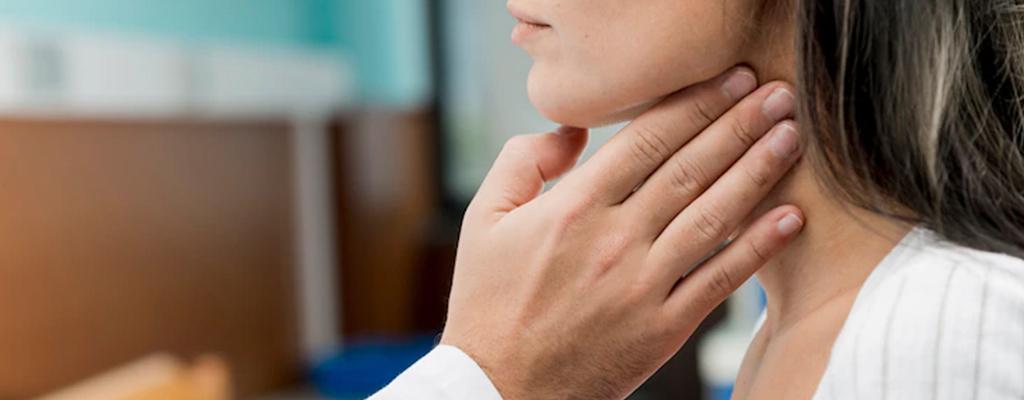Home | Diseases We Treat | Thyroid
Thyroid

Most common types of thyroid disease are known as ‘Hypo’ (Hypothyroidism) and ‘Hyper’ (Hyperthyroidism) which occur due to changes in thyroid hormones and whether it is ‘Hypo’ or ‘Hyper’ is determined depending on the drop or rise of the thyroid hormones.
Generally, the Thyroid Function Test (TFT) is done by observing changes in various factors like patient’s weight, skin, obesity, mood or temperament, changes in menstrual cycle etc. and the reports primarily reveal a rise in the factors such as TSH, T3, T4. Modern medical science terms it an Auto-Immune disorder and doctors advise a tablet every day. It has multiple side effects which involve obesity, osteoporosis, low metabolism, and low peristaltic movements which lead to constipation. With proper Ayurvedic treatment and Panchakarmas, this disorder can be totally Drug-less and a patient can enjoy a life free of any health complications.
Why me?
The thyroid is primarily found in elderly people and is more common in women. Apart from a wrong diet, it is believed to be an outcome of improper lifestyle and negativity in thoughts and overall approach towards the life.
The pituitary gland is situated at the bottom of the brain. For ease of understanding, we can say they are at the center of the two eyebrows. The thyroid gland is controlled by this pituitary gland. Thatʹs why perhaps, our ancient Indian tradition prescribes placing of Haldi-kumkum tika or bindi at this spot. This is an important point where concentration is meant to be focused during the meditation. The pituitary gland plays an important in our brain function. It helps to have good metabolism and regularity in menstruation, which ultimately keeps us calm, composed, and happy. With an extensive ʺPanchabhoutik chikitsaʺ (study and clinical assessment of five basic elements in our body viz. Prithvi = matter, Aap = Water, Tej = Fire, Vayu = Air & Aakash = space), as elaborated in the Ayurveda we can go to the root cause of the disease by asking some history taking questions, clinical examination, udar–parkisha, naad–pariksha, and naadi–pariksha. This gives us an important lead to arrive at proper diagnosis on the basis of birth-month related genetic & temperamental attributes of the patient and we can get the answer to the question ʺWhy me? ʺ This type of treatment brings astonishing effect.
How can you overcome it?
The first step is direct/online preliminary consultancy, where the patient and/or his pathological reports such as TFT are checked. Seven days of residential treatment at Prakruti is most effective and essential. This facilitates direct monitoring and helps to have proper counseling about lifestyle changes, diet, medication, panchakarmas, exercises, yog, pranayam, etc.
A journey towards healthy life
Salient features of Residential Panchakarma camp
Treatment for every patient is exclusively designed and individualized after a thorough study of his birth month and season in which he or she was born. Accordingly, his genetic attributes are studied.
Similarly, other aspects such as the profession of the patient, his lifestyle, the root cause of the disorder, time span and intensity of health issues, etc. are taken into consideration. Accordingly, every day 13 – 15 panchakarma treatments are rendered and complete training is imparted to perform yog, pranayama, and meditation on regular basis. The consulting doctors also suggest a proper diet plan and an ideal lifestyle.
At Prakruti, the treatment regimen for Thyroid patients starts at 6.00 am. when ‘Niruhabasti’ is administered to the patients. This Panchakarma treatment involves herbal decoction mixed with honey, rock salt, etc. It is administered like an enema. The purpose of this treatment is to improve digestion and increase stress-bearing capacity etc.
Subsequently from 6.30 am. to 7.00 am. Nasya treatment to improve the functioning of pituitary glands.
This is followed by Gandusha which is done to stimulate the thyroid glands and subsequently Anjana and dhoomapaan treatments are given, as specified in the ancient Ayurveda samhitas.
At 7.30 .. Specific Yoga session is conducted focusing on certain yoga asanas which are useful for thyroid patients. Later, after breakfast, massage and steam-bath are given, and after the mid-day meals treatments like talam/shirodhara are given for soothing of mind and stress relieving. Similarly, other treatments or activities like yog-nidra, different refreshing games, jentak swed, meditation, light exercises, padabhyanga, arti & pravachana (spiritual discourse), health-related lectures, consultation, matra-Basti, Karna Puran and Anjan, etc. are conducted for thyroid patients and accordingly their reports are prepared and monitored. Overall 13-15 panchakarma treatments are done every day for a thyroid patient.
